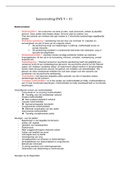Diabetis mellitus type 1 - Samenvattingen, Aantekeningen en Examens
Op zoek naar een samenvatting over Diabetis mellitus type 1? Op deze pagina vind je 9 samenvattingen over Diabetis mellitus type 1.
Alle 9 resultaten
Sorteer op
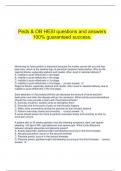
-
Peds & OB HESI questions and answers 100% guaranteed success.
- Tentamen (uitwerkingen) • 23 pagina's • 2024
-
Ook in voordeelbundel
-
- €12,29
- + meer info
Peds & OB HESI questions and answers 100% guaranteed success. Monitoring for fetal position is important because the mother cannot tell you she has back pain, which is the cardinal sign of persistant posterior fetal position. Why do the regional blocks, especially epidural and caudal, often result in assisted delivery? A. inability to push effectively in 3rd stage B. inability to push effectively in 4th stage C. inability to push effectively in 1st stage D. inability to pu...
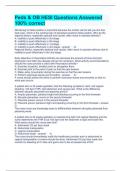
-
Peds & OB HESI Questions Answered 100% correct
- Tentamen (uitwerkingen) • 23 pagina's • 2023
-
Ook in voordeelbundel
-
- €22,12
- + meer info
Peds & OB HESI Questions Answered 100% correct Monitoring for fetal position is important because the mother cannot tell you she has back pain, which is the cardinal sign of persistant posterior fetal position. Why do the regional blocks, especially epidural and caudal, often result in assisted delivery? A. inability to push effectively in 3rd stage B. inability to push effectively in 4th stage C. inability to push effectively in 1st stage D. inability to push effectively in 2nd stage D. ...
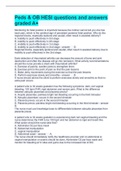
-
Peds & OB HESI questions and answers graded A+
- Tentamen (uitwerkingen) • 23 pagina's • 2023
-
Ook in voordeelbundel
-
- €17,21
- + meer info
Monitoring for fetal position is important because the mother cannot tell you she has back pain, which is the cardinal sign of persistant posterior fetal position. Why do the regional blocks, especially epidural and caudal, often result in assisted delivery? A. inability to push effectively in 3rd stage B. inability to push effectively in 4th stage C. inability to push effectively in 1st stage D. inability to push effectively in 2nd stage D. Regional blocks, especially epidural and caudal,...
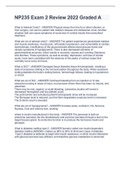
-
NP235 Exam 2 Review 2022 Graded A
- Tentamen (uitwerkingen) • 9 pagina's • 2022
-
Ook in voordeelbundel
-
- €9,34
- + meer info
What is Adrenal Crisis? - ANSWER Physical stress from the flu or other infection, or from surgery, can send a patient with Addison disease into Addisonian crisis. Another situation that can cause symptoms of acute lack of cortisol results from prescribed treatment. What are s/s of adrenal crisis? - ANSWER The patient experiences generalized malaise and muscle weakness, muscle pain, orthostatic hypotension, and vulnerability to cardiac dysrhythmias. Insufficiency of the glucocorticoids affects...
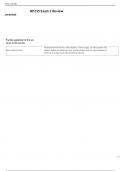
-
NP235 Exam 2 Review Practice questions for this set Terms in this set (53) What is Adrenal Crisis? Physical stress from the flu or other infection, or from surgery, can send a patient with Addison disease into Addisonian crisis. Another situatio
- Tentamen (uitwerkingen) • 7 pagina's • 2024
-
Ook in voordeelbundel
-
- €7,86
- + meer info
NP235 Exam 2 Review Practice questions for this set Terms in this set (53) What is Adrenal Crisis? Physical stress from the flu or other infection, or from surgery, can send a patient with Addison disease into Addisonian crisis. Another situation that can cause symptoms of acute lack of cortisol results from prescribed treatment. What are s/s of adrenal crisis? The patient experiences generalized malaise and muscle weakness, muscle pain, orthostatic hypotension, an...

-
Exam (elaborations) NR 507 PATHOPHYSIOLOGY WEEK 5 TD1 Alterations in Endocrine Function Discussion Part One.pdf
- Tentamen (uitwerkingen) • 20 pagina's • 2022
-
- €8,35
- + meer info
Exam (elaborations) NR 507 PATHOPHYSIOLOGY WEEK 5 TD1 Alterations in Endocrine Function Discussion Part O This week's graded topics relate to the following Course Outcomes (COs). 1 Analyze pathophysiologic mechanisms associated with selected disease states. (PO 1) 2 Differentiate the epidemiology, etiology, developmental considerations, pathogenesis, and clinical and laboratory manifestations of specific disease processes. (PO 1) 3 Examine the way in which homeostatic, adaptive, and c...

-
NR 507 PATHOPHYSIOLOGY WEEK 5 TD1 Alterations in Endocrine Function Discussion Part One (NR507)
- Tentamen (uitwerkingen) • 20 pagina's • 2021
-
- €8,84
- + meer info
Exam (elaborations) NR 507 PATHOPHYSIOLOGY WEEK 5 TD1 Alterations in Endocrine Function Discussion Part One (NR507) Week 5: Alterations in Endocrine Function - Discussion Part One Loading... This week's graded topics relate to the following Course Outcomes (COs). 1 Analyze pathophysiologic mechanisms associated with selected disease states. (PO 1) 2 Differentiate the epidemiology, etiology, developmental considerations, pathogenesis, and clinical and laboratory manifestations of specific d...
In het document de belangrijkste punten van owe 9 + 10 uitgebreid beschreven. Omvat alle beschreven onderwerpen.
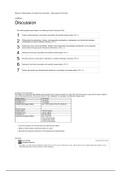
-
NR507 Week 5: Alterations in Endocrine Function - Discussion Part One
- Overig • 19 pagina's • 2021
-
- €13,27
- + meer info
NR507 Week 5: Alterations in Endocrine Function - Discussion Part One Ms. Blake is an older adult with diabetes and has been too ill to get out of bed for 2 days. She has had a severe cough and has been unable to eat or drink during this time. She has a history of Type I diabetes. On admission her laboratory values show: Sodium (Na+) 156 mEq/L Potassium (K+) 4.0 mEq/L Chloride (Cl–) 115 mEq/L Arterial blood gases (ABGs) pH- 7.30; Pco2-40; Po2-70; HCO3-20 Normal values Sodium (Na+) 136-...

Studiestress? Voor verkopers op Stuvia zijn dit juist gouden tijden. KA-CHING! Verdien ook aan je samenvattingen en begin nu met uploaden. Ontdek alles over verdienen op Stuvia



